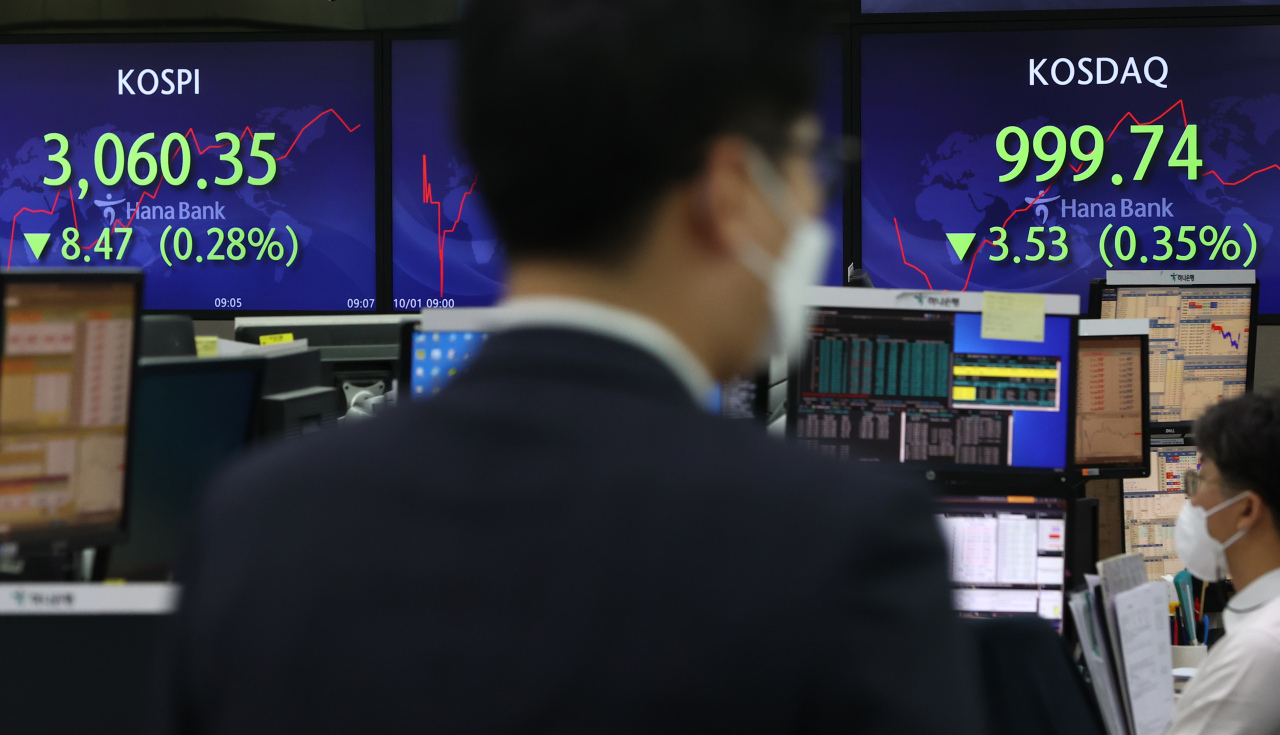 |
A screen shows Kospi chart in the Hana Bank dealing room in Myeong-dong, Seoul (Yonhap) |
South Korea’s stock market slumped in September on the back of the debt crisis involving Evergrande Group, one of China’s biggest property developers, and a hint by the US Federal Reserve that it would begin tapering.
According to the Korea Exchange, the country’s stock market operator, the benchmark Kospi lost 4.08 percent to 3,068.82 points during September. The secondary tech-heavy Kosdaq shed 3.88 percent to close at 1,003.27 points during the same period.
Kospi’s monthly drop last month marked the second-largest fall since March 2020, when the market slumped 11.69 percent as the world faced the COVID-19 outbreak.
September’s decline was spurred by institutional investors, who sold a net 4.20 trillion won ($3.54 billion) of shares in South Korean companies in September, amid growing concerns over global uncertainties that could spill over to South Korea’s market.
In terms of individual companies, they offloaded 1.35 trillion won worth shares in Samsung Electronics, one of the country’s chipmaking giants and 744 billion won in Kakao Bank, the country’s first Internet-only bank to go public, during the cited period.
The plunge is likely to continue in October, as the same uncertainties remain unresolved.
“Global factors such as Evergrande’s potential default and the US tapering issue have been taking a toll on the Kospi,” Shinhan Investment Group analyst No Dong-gil said. “There are still more unfavorable factors in the stock market, such as steep rises in prices and interest rates, deepening global supply chain disruptions, China and Europe’s energy supply shortage, and the risk of a default by Evergrande Group,“ No added.
In addition, the US Federal Reserve signaled it was likely to start tapering its $120 billion monthly purchases of government bonds soon. Since tapering tends to result in an interest rate hike, concerns rise that South Korea might also follow suit in raising its benchmark rate, experts said.
“The inflation pressure, followed by an interest hike and China’s Evergrande crisis that could negatively impact the Chinese economy, could further hinder market liquidity and investment sentiment,” Lee Eun-taek, a KB Securities analyst, noted.
Meanwhile, Kospi retreated 49.64 points, or 1.62 percent, to close at 3,019.18 points on Friday.
By Byun Hye-jin (
hyejin2@heraldcorp.com)








![[Today’s K-pop] Blackpink’s Jennie, Lisa invited to Coachella as solo acts](http://res.heraldm.com/phpwas/restmb_idxmake.php?idx=644&simg=/content/image/2024/11/21/20241121050099_0.jpg)